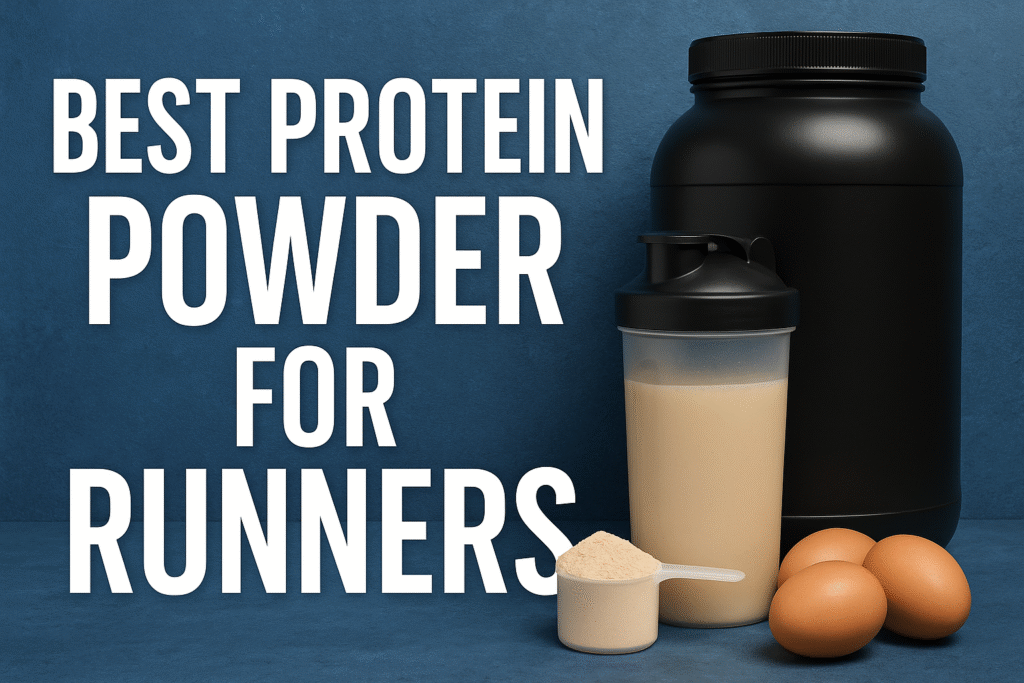Best Protein Powder For Runners: Are your legs still sore hours after a run? Do you feel drained and slow to recover from hard workouts? Muscle fatigue and slow recovery can feel frustrating. Often, the missing piece is enough protein to rebuild muscles and fuel performance. In this guide, I’ll walk you through why runners need protein powder, how to choose the right one, and share my top picks (all available on Amazon USA) that have helped many fellow runners feel stronger.
Why do runners need protein? Endurance exercise breaks down muscle fibres, so we need protein to repair and rebuild those muscles. Protein also supports immune function and makes haemoglobin for oxygen delivery – extra important when you’re racking up miles. Many runners started supplementing with protein after runs, and their soreness was way down, and workouts felt easier. Sports dietitians agree that having protein (plus carbs) soon after a run speeds recovery.
Most experts recommend endurance athletes consume 1.4–1.6 grams of protein per kilogram of body weight per day, sometimes up to 2.0 g/kg during intense training. For example, at 70 kg (155 lb), that’s about 100–120 grams daily. To visualise, one large egg has ~7 g of protein and a chicken breast has 25–30 g. If your diet (meals and snacks) doesn’t hit this, a protein powder helps ensure you meet your goals.
By adding a shake after hard runs, runners noticed their legs felt fresher the next day, just like Olympic runner Kara Goucher, who credits post-run protein shakes for faster recovery. In short, the best protein powder for runners is the one that helps your muscles recover quickly without upsetting your stomach or training. Now let’s look at how to choose the right protein powder step by step.
Best Protein Powder for Runners: Boost Your Recovery and Performance
How to Choose the Right Protein Powder: 5 Steps
Picking the right powder isn’t rocket science, but I created a checklist to make sure you get quality and results. Here are 5 steps you can use every time, with examples:
Calculate Your Protein Needs
First, figure out how much protein you need. A good rule of thumb for runners is 1.6 g/kg bodyweight per day. For a quick estimate, multiply your weight (in kg) by 1.6. For example, if you weigh 68 kg (150 lb), that’s about 108 g of protein daily. (You can also use online protein calculators like BarBend’s Protein Intake Calculator.) This total includes all meals and snacks; aim to get roughly a quarter of it from a post-run shake.
Choose Protein Type
Whey protein is a popular choice because it’s quickly absorbed, tastes great, and provides all essential amino acids. I usually use a whey isolate like Transparent Labs Grass-Fed Whey (28 g protein per scoop) or Optimum Nutrition Gold Standard Whey (24 g per scoop). For plant-based diets, pea or rice protein blends work well. For example, I have seen my friends try Naked Pea (a single-ingredient pea protein) and Vega Sport (a multi-plant blend) when they needed dairy-free options. Both deliver around 25–30 g of protein per serving without animal products. Vegans and vegetarians should look at organic plant proteins (like Garden of Life or Orgain Organic) to ensure a complete amino acid profile.
Check Ingredient Quality
Read labels carefully: I avoid powders with artificial sweeteners, fillers or heavy sugars. Many quality brands list only protein sources, plus natural flavours and maybe a sweetener like stevia. For example, Naked Pea contains just pea protein isolate—no additives. Also, watch for allergens (gluten, dairy, soy) if needed. If you compete or care about purity, pick a powder tested for banned substances. For instance, Naked Nutrition’s products are Informed-Choice certified and NSF Certified for Sport, meaning third-party labs confirmed they’re free of athletic-banned drugs.
Compare Nutrition Facts
Look at protein per scoop, calories, and carb/sugar content. Runners on heavy training may actually benefit from some carbs in recovery (aim for a 3:1 carb: protein ratio after very long runs). But if you just need a protein boost, pick powders with <5 g carbs and <2 g sugar per serving. For example, Transparent Labs Whey Isolate (28 g protein, 1 g sugar) is lean, whereas some leaner products like ON Gold Whey (24 g, 1–3 g sugar) are slightly lower in protein but cost-effective. If you prefer an all-in-one shake, recovery blends (with added electrolytes or carbs) exist, but you can also mix plain protein with a banana or oats after a run, as I often do.
Test Taste and Mixability
Finally, make sure you actually like it! Trust me, a gritty, chalky powder will discourage use. I always try a small tub or single-serve packet first. Best tasting protein powders for runners often include flavours like chocolate peanut butter, vanilla, and seasonal options (peppermint, pumpkin spice). For example, Transparent Labs adds fun flavours like French Vanilla, and Vega Sport has a mocha taste that some runners enjoy. If flavour is king for you, look at reviews: one Reddit runner recommended 1st Phorm Level-1 or Optimum Gold for flavour and mixability. I’ve found that blending with milk or a high-speed blender improves the texture.
Tip: Always mix according to package instructions and drink within 30–60 minutes after a run. I often carry a shaker bottle in my car to toss in water and protein right after a workout or morning run. This protein shake ritual helps kickstart recovery immediately.
My Top Picks: Best Protein Powders for Runners
Based on science and personal testing, here are the powders I trust most for distance running and recovery. All are widely available on Amazon USA:
Transparent Labs 100% Grass-Fed Whey Isolate
My go-to whey isolate. It delivers 28 g of protein per scoop and has no artificial ingredients. I love that it’s third-party tested for purity and comes in 15 tasty flavours (Chocolate Peanut Butter is my favourite). Many endurance athletes recommend it because it mixes smoothly and fuels recovery. Transparent Labs Grass-Fed Whey Protein Isolate on Amazon (Ultra-pure, third-party tested).
Optimum Nutrition Gold Standard Whey
A classic choice and budget-friendly. Each scoop has 24 g of protein from whey isolates/concentrates. It’s well-mixed and comes in dozens of flavours. For marathon training, when you’re running lots of miles, this one would help you hit your macros without breaking the bank. ON Gold Standard Whey on Amazon (Widely available, great price).
Garden of Life Raw Organic Protein
A great plant-based option. It has ~22 g of protein per scoop from organic peas, rice, and other plants. I recommend this for vegetarian runners or anyone who wants clean ingredients (it’s gluten-free, dairy-free, no fillers). It also contains probiotics and enzymes for digestion. Vega and Orgain organic protein powders are similar (both vegan and well-rated). Garden of Life Raw Organic Protein on Amazon (Organic plant protein blend).
Vega Sport Premium Protein
Specifically formulated for athletes. It provides 30 g of protein from pea, pumpkin seed, and alfalfa proteins, plus tart cherry, probiotics, and turmeric to aid recovery. If you use Vega Sport before long runs, it takes a bit of extra mixing, but the Mocha flavour is surprisingly good (like chocolate coffee). If you need a vegan formula with added recovery nutrients, this is solid. Vega Sport Protein on Amazon (Plant-based with extras like tart cherry).
Naked Nutrition Powders (Whey or Pea)
For a clean, no-nonsense product, I like Naked. Their Naked Whey Isolate has just 2 ingredients (whey protein, sunflower lecithin) and 30 g of protein per scoop. I also like the Naked Pea (27 g protein) made from simple pea protein. These powders are very pure (no sweeteners/flavours), which is great if you’re sensitive to additives. You can make oatmeal with Naked Pea, and the texture will turn out super creamy. The taste is “pea-y”, but mixed with banana or in smoothies, it’s fine. Naked Whey Isolate on Amazon (Unsweetened, minimal ingredients), Naked Pea on Amazon (100% pea protein).
Vega One All-in-One Shake
A vegan “meal replacement” style shake. It has about 15 g of protein plus fibre, greens, vitamins and more. This isn’t as protein-packed as others, but for a quick breakfast, I like that it includes other nutrients. Vega One Shake on Amazon (Plant protein plus greens).
Overall, there’s no one “best” powder for everyone; it depends on diet, budget, and digestion. But the powders above cover all major types (whey vs plant, flavoured vs natural). They’re among the best protein powder brands for runners because they mix easily, taste good, and are made for athletes (often with NSF or Informed Sport certifications).
Best Market Practices for Protein and Running
To maximise the benefit of protein powder, consider these industry best practices:
Time it right
Aim to consume protein (with some carbs) soon after exercise. Many coaches recommend within 30 minutes, though newer research suggests the “window” might be broader. Either way, don’t delay refuelling – I personally have my protein smoothie as the very first thing when I get home from a workout or a run. This kicks off muscle repair and glycogen restoration (especially important after long training sessions).
Keep it consistent
Spread your protein intake across the day. Aim for 20–30 g per meal/snack. For example, breakfast with eggs (one egg ≈, 7 g), lunch with chicken, and a protein shake after an evening run. This consistently feeds muscles.
Mix protein sources
While whey is fast-digesting, casein (from milk) digests more slowly. Some runners take casein at night. Plant proteins often lack one or two amino acids (like methionine in peas), so combining pea+rice (or using a blend like Vega Sport) ensures a complete profile.
Hydrate and eat carbs, too
Protein alone won’t fuel a runner’s performance. Always pair your shake with fluids and some carbs (like a banana or oat milk). The classic 3:1 or 4:1 carb-to-protein recovery ratio is still a smart guideline for long runs.
Choose certified products
If you race competitively, choose powders certified by NSF Certified for Sport or Informed Choice. This avoids unintentional doping. Even if you’re a recreational runner, these labels mean strict quality control (ingredients match the label, no heavy metals or contaminants).
By following these best practices, you can ensure every shake is doing its job. Consistency and quality are just as important as which powder you pick.
Frequently Asked Questions
Which protein powder is good for runners?
Any powder that’s high-quality, easily digestible, and convenient post-run can work. Whey isolates (like Transparent Labs or Optimum) are top choices due to their complete amino profile and fast absorption. For vegan runners, look for a blend (pea/rice/hemp) such as Vega Sport or Orgain Organic Protein. The “best” one depends on your diet, allergies, and taste preferences. Many runners prefer powders tested for sport (NSF, Informed Choice) to avoid banned substances.
What proteins are best for runners?
Besides supplements, whole-food proteins are great: eggs (7 g each), lean meat (25+ g per chicken breast), dairy (yoghurt, milk), and plant sources like lentils and quinoa. But after hard runs, liquid proteins (shakes) are convenient for fast absorption. Whey protein (from milk) has the highest leucine content for muscle repair. Vegan proteins (pea, soy, rice) are also effective if you combine them to get all the essential amino acids.
Should I take protein powder if I’m a runner?
If you can meet your protein needs through food, you may not need powder. However, busy schedules or appetite suppression from high-volume training can make it hard to eat enough. A shake is an easy way to ensure you hit your target. I find that on long-run days, it’s tough to eat the extra 30–50 g of protein I need, so I rely on a shake. In summary, protein powder is a helpful tool (not a magic cure), especially for recovery and convenience.
How much protein should a runner eat?
Aim for about 1.4–1.6 grams per kg of body weight per day. For example, a 70-kg (155-lb) runner might target 100–115 g daily. During heavy training, you might go toward 1.8–2.2 g/kg. Remember, this includes all meals and snacks, not just shakes. If your weight or training goals change (gaining muscle or cutting fat), adjust within the 1.4–2.4 g/kg range.
Is creatine good for runners?
Creatine is not a protein, but a popular supplement that helps high-intensity efforts by replenishing energy. It can help runners with short bursts (like sprint finishes or hill reps), but it doesn’t directly increase endurance. It’s legal in competition (not banned). If you’re focusing on long-distance, prioritise carbs and protein first; creatine is optional. Some runners do take creatine alongside protein to maintain leg strength, and it’s generally safe.
Is BCAA good for runners?
Branched-chain amino acids (BCAAs) are abundant in complete proteins (like whey). If you’re already meeting your protein goals with whole food and shakes, extra BCAAs usually aren’t necessary. Getting whole protein post-run (with all amino acids) is better than isolated BCAA supplements.
How much protein is in one egg?
A large egg provides about 6–7 grams of protein. Eggs are a complete protein with all essential amino acids, making them a runner-friendly whole food option.
How to increase running stamina?
Beyond protein, stamina comes from consistent training, adequate carbs, hydration, sleep, and overall nutrition. Eating enough total calories and carbs is crucial for long runs. Iron-rich foods (for oxygen transport) and electrolytes can help too. Protein plays a supportive role by repairing muscles so you can train harder next time.
What should I drink after running?
Aim for a recovery drink with both carbs and protein. Many runners enjoy chocolate milk (a 4:1 carb-protein ratio) or a homemade smoothie with fruit and whey. Otherwise, use a recovery powder or mix (some plant-based brands include greens and electrolytes) or a shake with protein powder plus a banana or oatmeal. The key is to rehydrate and refill muscle glycogen along with repairing muscle tissue.
These FAQs cover the essentials related to protein and running. Remember, every runner is different: factor in your personal needs, training load, and any dietary restrictions. Always check with a dietitian or coach if you have specific health concerns.
Conclusion: Best Protein Powder For Runners
Incorporating the right protein powder into my routine made a big difference in my training. By following the steps above and picking a high-quality product, I recovered faster, reduced muscle soreness, and felt stronger on my runs and workout sessions. I hope these tips help you find the best protein powder for runners and make your training more effective. Happy running and stay strong!
If you found this guide helpful, please follow me for more running nutrition tips and reviews.

Mohammad Nazif Uddin is a Marketing and Supply Chain Management student and fitness enthusiast with over 5 years of bodybuilding experience. As the founder of Muscle Theory, he shares practical insights on fitness supplements to help others make informed choices and achieve their goals safely.

